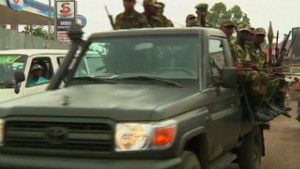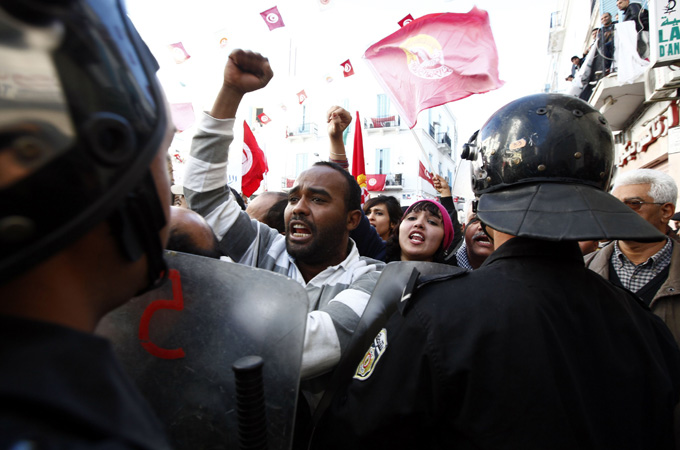Twenty-two hostages held for nearly three years are released after two-week long siege by Puntland maritime police. | ||
| ||
| A ship and its crew of 22 sailors held by Somali pirates for almost three years have been freed after a two-week-long siege by maritime police, the government of the breakaway region of Puntland said. "After two years and nine months in captivity, the hostages have suffered signs of physical torture and illness. The hostages are now receiving nutrition and medical care," the president's office of the northern Somali enclave said on Sunday in a statement. The sailors aboard Panama-flagged MV Iceberg 1, from the Philippines, India, Yemen, Sudan, Ghana and Pakistan, were held for longer than any other hostages by the pirates who prey on shipping in the region. Maritime police began to lay siege to the vessel on December 10 near the coastal village of Garaad in the region of Mudug. The ship originally had a crew of 24, but two have died since the roll-on roll-off cargo vessel was seized on March 29, 2010, some 16km from Aden, the pirates said. Release 'kindly requested'One of the pirate leaders said they only released the ship after negotiations with Puntland officials and local elders.Farah did not disclose whether any ransom had been paid for the crew and the ship, owned by Azal Shipping in Dubai."They kindly requested the release of the ship we held for three years. Puntland forces had attacked us and tried to release the ship by force but they failed. We fought back and defeated them," a pirate known as Farah told the Reuters news agency. Pirates rarely release ships without ransom, and usually raise their demands the longer they hold a vessel - because they charge for their expenses. Close to 120 seafarers are still held by Somali pirates, though that number is considerably down from the height of the piracy crisis two years ago, when more than 600 hostages were held at any given time. Hijackings by Somali pirates have been significantly reduced in the last couple of years because many ships now carry armed guards and there is an international naval armada that carries out onshore raids. In 2012, pirates seized 47 vessels. So far this year, they have taken five, a decrease that could signify the scourge is ending, though experts say it is too early to declare a victory. |
Mr. Bailey's 2nd Block IR-GSI Class blog focused on the current events of Sub-Saharan Africa
Thursday, December 27, 2012
Somali troops 'free' pirate-held hostages
Thursday, December 20, 2012
Rwanda genocide: ICTR jails Augustin Ngirabatware
 |
A UN war crimes court has sentenced a key organiser of the 1994 Rwandan genocide to 35 years in prison. |
About 800,000 people - ethnic Tutsis and moderate Hutus - were killed in 100 days in Rwanda in 1994.
The ICTR convicted Ngirabatware of genocide, incitement to commit genocide and rape as a crime against humanity, the AFP news agency reports.
"For these crimes the court sentences you to 35 years in prison," Judge William Hussein Sekule told Ngirabatware.
He was planning minister in the militant Hutu-led government at the time of the genocide.
Ngirabatware was arrested in Germany in September 2007 and was transferred more than a year later to the ICTR in Arusha, Tanzania.
The ICTR says on its website that it has completed 71 cases since it was set up under a UN Security Council resolution in November 1994 to try the ringleaders of the genocide.
Ten accused were acquitted while 32 convicts are serving sentences, it says.
It is due to close in 2014 after it has finalised 16 appeal cases.
Tuesday, December 18, 2012
Congo militia boss Ngudjolo acquitted of war crimes at Hague
DR Congo Seeks Democracy
Former Congolese militia leader Mathieu Ngudjolo Chui has been acquitted by the International Criminal Court of war crimes and crimes against humanity.
The case related to the 2003 killings of 200 residents of Bogoro village in the mineral-rich Ituri region of the Democratic Republic of Congo. The court in the Hague heard reports of victims being burned alive, babies smashed against walls and women raped.
Mr Ngudjolo denied ordering the attack, saying he learned of it days later.
He had been charged with seven counts of war crimes and three of crimes against humanity. Prosecutors said he had enlisted child soldiers to carry out the killings. Some of the killings were carried out with machetes.
But presiding Judge Bruno Cotte said the court acquitted Mr Ngudjolo of all charges, saying the prosecution had "not proved beyond reasonable doubt that Mathieu Ngudjolo Chui was responsible" for the crimes committed.
Friday, December 14, 2012
Post-election tension shakes African beacon of stability
Political leaders as well as election observers in Ghana have called for calm after the top opposition party threatened to contest the results of the recent presidential poll. Are Ghanaians likely to listen?
International and regional election observers say Ghana’s recently conducted presidential poll appeared transparent, which saw incumbent John Mahama beating his rival by a slim majority, with a local monitoring group on Monday urging respect for the results.
Yet tensions have been rising in the Ghanaian capital of Accra since Sunday, when the country’s electoral commission declared Mahama the winner with 50.7% - just enough to avoid a run-off with his chief rival Nana Akufo-Addo, who got 47.7% of the vote.Hundreds of Akufo-Addo supporters demonstrated outside the electoral commission offices, compelling security forces to use tear gas to disperse the crowd.
Thursday, December 13, 2012
Congo Rebel Group Demands President's Resignation
The rebel group starting negotiations with the Congolese government wants the country's president to resign, according to a rebel document.
Jean-Marie Runiga, president of the M23 rebels said to be backed by Rwanda, on Thursday showed The Associated Press a list of demands that he said will be presented to the Congolese government.
The rebels' demand for Congolese President Joseph Kabila to step down comes as a leading advocacy group says the president is "unable to effectively govern the country."
The M23 recently withdrew from Goma, the capital of North Kivu province in eastern Congo, in order to begin negotiations with Congolese President Joseph Kabila's government.
Jean-Marie Runiga, president of the M23 rebels said to be backed by Rwanda, on Thursday showed The Associated Press a list of demands that he said will be presented to the Congolese government.
The rebels' demand for Congolese President Joseph Kabila to step down comes as a leading advocacy group says the president is "unable to effectively govern the country."
The M23 recently withdrew from Goma, the capital of North Kivu province in eastern Congo, in order to begin negotiations with Congolese President Joseph Kabila's government.
New hope for Somalia, says scholar MP
Somali professor on his country's future
STORY HIGHLIGHTS
- In September, Somalia established its first stable central government in decades.
- Professor Ahmed Ismail Samatar says the new president is facing "heavy challenges"
- Samatar is a professor at Macalester College in Minnesota, U.S.
- He ran for president in the recent Somali elections and is now a member of parliament
Political newcomer Hassan Sheikh Mohamud, an academic and activist who has also worked for the United Nations and other organizations, was sworn in the capital Mogadishu after defeating incumbent president Sheikh Sharif Sheikh Ahmed. The milestone vote was hailed by the international community as a sign of improving security in a nation plunged into chaos after years of vicious civil hostilities.
South Africa's Zuma to face leadership challenge
Kgalema Motlanthe, the president's deputy, to run against Jacob Zuma for leadership of ruling African National Congress. | |||
| |||
| Kgalema Motlanthe, South Africa's deputy president, has agreed to run against President Jacob Zuma for the leadership the country's ruling party, the African National Congress (ANC). Motlanthe accepted nominations from several provinces and the party's youth league to enter the race to be the ANC's next president, his spokesman Thabo Masebe said on Thursday. |
Post-election tension shakes African beacon of stability
Political leaders as well as election observers in Ghana have called for calm after the top opposition party threatened to contest the results of the recent presidential poll. Are Ghanaians likely to listen?
International and regional election observers say Ghana’s recently conducted presidential poll appeared transparent, which saw incumbent John Mahama beating his rival by a slim majority, with a local monitoring group on Monday urging respect for the results.
Yet tensions have been rising in the Ghanaian capital of Accra since Sunday, when the country’s electoral commission declared Mahama the winner with 50.7% - just enough to avoid a run-off with his chief rival Nana Akufo-Addo, who got 47.7% of the vote.Mali's president names new prime minister
The prime minister’s ouster comes as the United Nations considers backing a military intervention in Mali, a once-stable country now in constant turmoil. The development raises questions about the viability of the operation, which would use the country’s military in an attempt to take back Mali’s north from Islamic extremists.
Prime Minister Cheikh Modibo Diarra, dressed in a dark suit and his forehead glistening with sweat, appeared on state television at 4 a.m. to announce his resignation, hours after soldiers stormed his house and forced him into their vehicle.
Congo rebels return to peace talks
By RODNEY MUHUMUZA | Posted: Tuesday, December 11, 2012 10:47 am
 M23's executive secretary, Francois Rucogoza, charged on Sunday that the Congolese government lacked "visionary leadership" in a lengthy statement at the start of talks in the Ugandan capital Kampala. The government delegation, which had already delivered a short, formal statement free of accusations, then said it had to respond to accusations of incompetence, xenophobia and corruption before substantive talks could begin.
Tshibanda said Tuesday he wanted the world to get "the real picture of this armed group and what they do in the area." M23, he said, is a criminal organization whose leaders routinely use child soldiers to win wars and whose troops rape women and carry out summary executions in territories they control in eastern Congo.
M23's executive secretary, Francois Rucogoza, charged on Sunday that the Congolese government lacked "visionary leadership" in a lengthy statement at the start of talks in the Ugandan capital Kampala. The government delegation, which had already delivered a short, formal statement free of accusations, then said it had to respond to accusations of incompetence, xenophobia and corruption before substantive talks could begin.
Tshibanda said Tuesday he wanted the world to get "the real picture of this armed group and what they do in the area." M23, he said, is a criminal organization whose leaders routinely use child soldiers to win wars and whose troops rape women and carry out summary executions in territories they control in eastern Congo.
Peace talks with rebels in eastern Congo should end with the disbandment of the M23 rebel movement, Congo's foreign minister said Tuesday, declaring it a criminally-minded organization that has caused suffering in the country.
Foreign Minister Raymond Tshibanda delivered his indictment of M23 on Tuesday after representatives of the group did not show up to a meeting Monday where the Congolese government delegation wanted to respond to earlier criticism by the rebels. M23's executive secretary, Francois Rucogoza, charged on Sunday that the Congolese government lacked "visionary leadership" in a lengthy statement at the start of talks in the Ugandan capital Kampala. The government delegation, which had already delivered a short, formal statement free of accusations, then said it had to respond to accusations of incompetence, xenophobia and corruption before substantive talks could begin.
M23's executive secretary, Francois Rucogoza, charged on Sunday that the Congolese government lacked "visionary leadership" in a lengthy statement at the start of talks in the Ugandan capital Kampala. The government delegation, which had already delivered a short, formal statement free of accusations, then said it had to respond to accusations of incompetence, xenophobia and corruption before substantive talks could begin.Mali's prime minister abruptly resigns after arrest
(CNN) -- Mali's prime minister abruptly resigned Tuesday on state television, a day after he was arrested by a group of soldiers loyal to a former coup leader.
The development is another blow to the stability of a country once hailed as a model of democracy in Africa, but one derailed by a coup and an uprising of Islamist militants.
Cheick Modibo Diarra, a former NASA engineer, who holds U.S. citizenship, was set to fly to Paris for medical care Monday, when he received notice that his bags had been removed from the plane, said a close aide, who did not want to be named.
Somali army captures key town from Al-Shabaab rebels
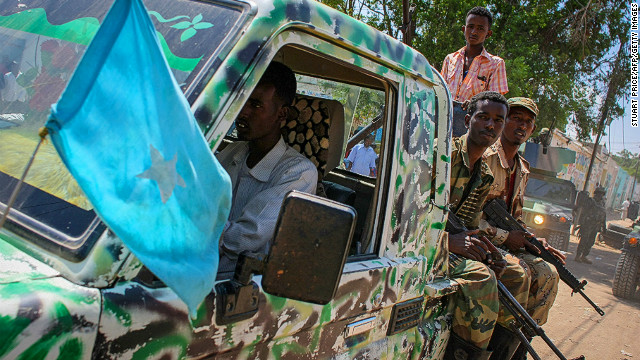 |
This photo released by the African Union-United Nations on November 18 shows soldiers of the Somali National Army. |
The joint forces faced little resistance, the African Union Mission for Somalia said in a press release, adding that Jowhar had been a major base for Al-Shabaab in southern Somalia.
Wednesday, December 12, 2012
Ghana president re-elected, a result opposition claims was 'manipulated'
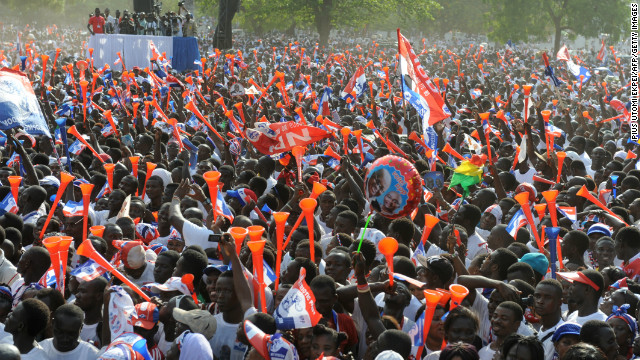 |
(CNN) -- Ghana's election commission announced Sunday night that the West African nation's president won re-election, though the main opposition party says it has "credible evidence" the results were manipulated. |
In a statement streamed live on the Internet, Electoral Commission Chairman Kwadwo Afari-Gyan declared "John Dramani Mahama president-elect" after securing 50.7% of the vote. Nana Akufo-Addo, the candidate for the New Patriotic Party (NPP), garnered 47.7% of the vote, according to the commission.
"We must celebrate together as Ghanaians and refrain from anything that will derail the peace and unity we have enjoyed over the years," Mahama told supporters after the result was announced.
Second blast in 3 days hits Somali neighborhood in Kenya
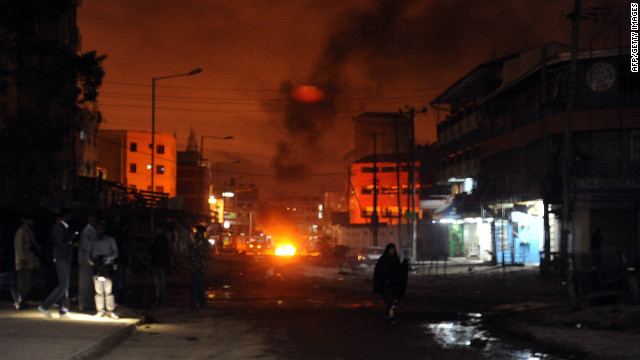 |
(CNN) -- A blast ripped through a neighborhood in Kenya's capital, killing three people in the second attack in three days targeting the predominantly Somali area. |
At least 16 others were injured in the Friday explosion near a mosque in Eastleigh, according to the Kenya Red Cross.
It was the second attack in three days targeting the Nairobi neighborhood.
On Wednesday, another blast left eight people injured -- three critically with severe head wounds, the Kenya Red Cross said in a statement.
Nelson Mandela has lung infection
JOHANNESBURG, South Africa (CNN) -- Nelson Mandela's current hospitalization is due to a lung infection, authorities said Tuesday.
Doctors were treating Mandela and he was responding to treatment, a statement from President Jacob Zuma's office said.
Mandela, 94, was hospitalized over the weekend at a Pretoria facility but the exact nature of his ailment had not been released.
Tuesday's statement said he had a recurrence of a previous lung infection.
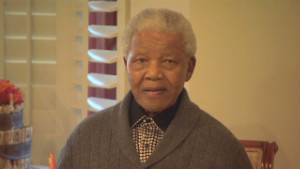 |
Mandela battles lung infection |
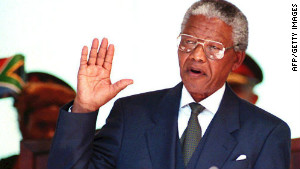 |
1994: Mandela's inauguration speech |
Armed men attack camp in eastern Congo after rebels pullout from captured city
(CNN) -- Armed men attacked a displaced persons camp in the eastern Democratic Republic of Congo early Sunday, raping women and looting at a facility where tens of thousands of people have taken refuge, a U.N. official said.
Simplice Kpandji, a spokesman for the United Nations' refugee agency, said it was unclear whether anyone had been killed at the camp, which is about 10 kilometers from Goma, the border city that has been a flashpoint for fighting between government troops and the M23 rebel group.
The Mugunga III camp houses more than 30,000 displaced people, many of whom fled to the camp when rebels advanced on Goma, Kpandji said. The attackers' identity was unknown, he said, and officials were working on gathering more information.
Central African Republic rebels seize Ndele from army

Rebel forces in the Central African Republic (CAR) have captured the key northern town of Ndele following a surprise attack, an army source has told the BBC.
Ndele is on a major route linking the CAR to Sudan, Cameroon and Chad.
The CAR has had a series of rebellions and coups since independence in 1975.
It is rich in mineral resources, including gold and diamonds, but its population is extremely poor.
Nelson Mandela suffering from lung infection
South Africa's former president Nelson Mandela has a recurring lung infection and is responding to medical treatment, officials revealed on Tuesday. The 94-year-old has been in a Pretoria hospital since Saturday.
South Africa’s former President Nelson Mandela is suffering from a recurring lung infection and is responding to medical treatments, the nation’s presidency sa
id Tuesday.
The ailing Mandela, 94, has been hospitalized since Saturday for medical tests at 1 Military Hospital near South Africa’s capital, Pretoria.
The announcement ended speculation about what was troubling the ailing anti-apartheid icon. Government officials had declined repeatedly to say what caused the nation’s military, responsible for Mandela’s care, to hospitalize the leader over the last few days. That caused growing concern in South Africa, a nation of 50 million people that largely reveres Mandela for being the nation’s first democratically elected president who sought to bring the country together after centuries of racial division.
The tests Mandela underwent at the hospital detected the lung infection, said presidential spokesman Mac Maharaj in a statement.
id Tuesday.
The ailing Mandela, 94, has been hospitalized since Saturday for medical tests at 1 Military Hospital near South Africa’s capital, Pretoria.
The announcement ended speculation about what was troubling the ailing anti-apartheid icon. Government officials had declined repeatedly to say what caused the nation’s military, responsible for Mandela’s care, to hospitalize the leader over the last few days. That caused growing concern in South Africa, a nation of 50 million people that largely reveres Mandela for being the nation’s first democratically elected president who sought to bring the country together after centuries of racial division.
The tests Mandela underwent at the hospital detected the lung infection, said presidential spokesman Mac Maharaj in a statement.
Congo's M23 rebels complete Goma pullout
The Democratic Republic of Congo’s M23 rebels completed their retreat from the regional capital of Goma on Saturday, after defying two earlier ultimatums to leave the city.
Hundreds of rebel fighters, singing and brandishing weapons, pulled out of Congo's eastern border city of Goma on Saturday, raising hopes for negotiations to end the insurgency.
The withdrawal of the M23 rebel movement from Goma on Lake Kivu, a strategic hub in Democratic Republic of Congo's war-scarred east, was agreed in a deal brokered by presidents of the Great Lakes states under Uganda's leadership a week ago.
Kieran Dwyer, spokesman for the U.N. Department of Peacekeeping Operations in New York, said the U.N. peacekeeping mission in Congo, or MONUSCO, confirmed the pullout was completed.
"The M23 has today withdrawn from Goma city in eastern DR Congo," he said in a statement. "MONUSCO mobilized 17 rapid reaction units in the city throughout the day to monitor the M23 withdrawal which took place in a largely orderly manner."
"MONUSCO troops secured key installations including the Central Bank, Governor's House and communications infrastructure at Goma Hill," Dwyer said.
Goma's fall on Nov. 20 to the Tutsi-led M23 insurgent group, which routed U.N.-backed government forces, triggered a diplomatic scramble to prevent a wider escalation of the eight-month-old rebellion in the conflict-prone region.
The rebels had said they would fight to topple Congo's president, Joseph Kabila, and march on the capital, Kinshasa, 1,600 km (1,000 miles) to the west. U.N. experts accuse Rwanda and Uganda of supporting the revolt, a charge both strongly deny.
In the centre of Goma, blue-helmeted U.N. peacekeeper
The withdrawal of the M23 rebel movement from Goma on Lake Kivu, a strategic hub in Democratic Republic of Congo's war-scarred east, was agreed in a deal brokered by presidents of the Great Lakes states under Uganda's leadership a week ago.
Kieran Dwyer, spokesman for the U.N. Department of Peacekeeping Operations in New York, said the U.N. peacekeeping mission in Congo, or MONUSCO, confirmed the pullout was completed.
"The M23 has today withdrawn from Goma city in eastern DR Congo," he said in a statement. "MONUSCO mobilized 17 rapid reaction units in the city throughout the day to monitor the M23 withdrawal which took place in a largely orderly manner."
"MONUSCO troops secured key installations including the Central Bank, Governor's House and communications infrastructure at Goma Hill," Dwyer said.
Goma's fall on Nov. 20 to the Tutsi-led M23 insurgent group, which routed U.N.-backed government forces, triggered a diplomatic scramble to prevent a wider escalation of the eight-month-old rebellion in the conflict-prone region.
The rebels had said they would fight to topple Congo's president, Joseph Kabila, and march on the capital, Kinshasa, 1,600 km (1,000 miles) to the west. U.N. experts accuse Rwanda and Uganda of supporting the revolt, a charge both strongly deny.
In the centre of Goma, blue-helmeted U.N. peacekeeper
Monday, December 10, 2012
Second blast in 3 days hits Somali neighborhood in Kenya

Smoke billows from a fire in a street, on December 7, 2012, following a large explosion outside a mosque in Nairobi. Three people were killed and eight wounded in the blast, the Kenyan Red Cross and police said. The blast followed one in the same neighborhood earlier in the week.
At least 16 others were injured in the Friday explosion near a mosque in Eastleigh, according to the Kenya Red Cross.
Ngozi Okonjo-Iweala's mother: Nigeria manhunt for kidnappers
 Ngozi Okonjo-Iweala, an internationally respected economist, has tried to tackle corruption in Nigeria
Ngozi Okonjo-Iweala, an internationally respected economist, has tried to tackle corruption in Nigeria
Nigeria's police have launched a manhunt for the kidnappers of Finance Minister Ngozi Okonjo-Iweala's mother, a spokesman has said.
Kamene Okonjo, a professor, was taken from her home in Delta State on Sunday.A finance ministry spokesman said Mrs Okonjo-Iweala had been threatened recently but did not know whether this was linked to the kidnapping.
Saturday, December 8, 2012
Armed men attack camp in eastern Congo after rebels pullout from captured city
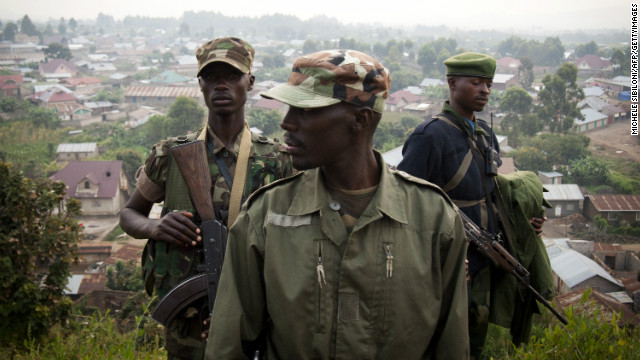 |
Colonel Sultani Makenga (C), head of the rebel M23 group, pictured in July. |
STORY HIGHLIGHTS
- It is unclear whether anyone was killed in the attack, a U.N. official says
- Attackers looted a displaced persons camp and raped women there, the official says
- The attack comes after U.N. monitors confirm that rebels have withdrawn from Goma
- The rebels were told by regional leaders to withdraw at least 12 miles from the city
Simplice Kpandji, a spokesman for the United Nations' refugee agency, said it was unclear whether anyone had been killed at the camp, which is about 10 kilometers from Goma, the border city that has been a flashpoint for fighting between government troops and the M23 rebel group.
The Mugunga III camp houses more than 30,000 displaced people, many of whom fled to the camp when rebels advanced on Goma, Kpandji said. The attackers' identity was unknown, he said, and officials were working on gathering more information.
Word of the attack came as U.N. monitors confirmed that rebels had withdrawn from Goma, more than a week after they seized the city from government forces.
Labour strikes hit several Tunisian regions | ||
| ||
| Strikes and protests have hit volatile areas of Tunisia, including Sidi Bouzid where the Arab Spring started, as tensions rose between powerful unions and Ennahdha, the centre-right Islamist party that is the largest member of the ruling coalition. Workers went on strike on Thursday in Kasserine, Gafsa and Sfax, Tunisia's second largest city, as well as Sidi Bouzid, where the 2010 uprising that unseated former President Zine El Abidine Ben Ali began. The closure of the largest private and public employers in those areas was called by regional branches of the General Union of Tunisian Workers (UGTT), with only small shops and cafes open for business. Hundreds of protesters in Gafsa and Sidi Bouzid took part in marches, chanting slogans denouncing Ennahdha. "We demand the resignation of the government," "Ennahdha has sold Tunisia," and "Long live the UGTT, the country's biggest force," the activists shouted. The UGTT, Tunisia's main labour union with a membership of 500,000, which was the only legal union under the previous regime, said the strike achieved a 95-per cent observance rate in Gafsa, a mining region prone to social unrest. The action was seen as a prelude to a nationwide general strike called for December 13 by the UGTT to denounce an attack on its headquarters this week that it says was carried out by armed men close to Ennahdha. The call for next Thursday's national strike is only the third by the UGTT since its foundation in the 1940s. Tunisia at 'crossroads'Weeks of escalating tensions between the union and Ennahdha, culminated on Tuesday when UGTT members demonstrating at their head office were attacked by pro-government activists.Ennahdha in turn accused the UGTT of orchestrating the confrontation. The General Tunisian Confederation of Workers, a smaller trade union formed after the revolution and claiming some 50,000 members, said on Thursday it was in "full solidarity" with the UGTT. The union denounced "all the hostile actions against the UGTT," and condemned those behind them, urging Ennahdha to respect "trade union freedoms". Last week, intense clashes between police and disaffected youths in the town of Siliana, southwest of Tunis, left about 300 people wounded, after a strike and protests over poor living conditions degenerated into violence. Ennahdha's veteran leader Rachid Ghannouchi strongly criticised the UGTT, calling it a "radical opposition" group, and charging that its calls to strike had "political and not social motives". Clashes, strikes and attacks have multiplied across Tunisia in the run-up to the second anniversary of the revolution, plunging the country into a political impasse. Many Tunisians feel bitterly disappointed by the failure of the revolution to improve their lives, especially in the country's marginalised interior which suffers from a chronic lack of development and high unemployment. During last week's violence, President Moncef Marzouki said the coalition government was not meeting the expectations of its people and called for a cabinet reshuffle, but Jebali did not respond. He warned that Tunisia was at a crossroads between "the road to ruin and the road to recovery". |
Thursday, November 29, 2012
Rwanda 'wanted new DR Congo rebel front'
 |
Ex-rebel Bestfriend Ndozi said their orders were to 'demoralise the government' |
DR Congo Seeks Democracy
- Rebel city
- Why Goma matters
- UN under fire
- Q&A: DR Congo's M23 rebels
Rwandan support for rebels in neighbouring Democratic Republic of Congo may be more widespread than previously believed, the BBC has found.
Kigali has already rejected UN accusations that it is backing the M23 rebel group which recently captured the strategic eastern city of Goma.Two ex-rebel fighters told the BBC they were offered money from Rwanda to set up a new front further south.
Indicted Kenyan politicians seek alliance
Former rivals deputy PM Kenyatta and ex-minister Ruto, facing trial at the ICC, in talks ahead of next year's election. | |||
| |||
| Two key Kenyan presidential hopefuls, both charged with crimes against humanity by the International Criminal Court ICC, are in negotiations for an alliance ahead of a presidential election in March 2013. Talks between Deputy Prime Minister Uhuru Kenyatta and ex-minister William Ruto are "going on", said Kenyatta's director of communications Munyori Buku, backtracking on an earlier statement that a formal deal had been struck. He withdrew an earlier statement claiming the two politicians had already "agreed on an alliance whose goals will be national unity, prosperity for all Kenyans [and] reconciliation". |
M23 rebels in slow retreat from Goma
Rebels believed to be backed by Rwanda began retreating from the territory they seized last week and pulled out of the region of Masisi, their military leader said Wednesday, in a sign that international pressure has stemmed the advance of the fighters.M23 rebels began leaving the region they captured last week and will abide by an ultimatum issued by neighbouring nations to withdraw from Goma by Friday, their leader said Wednesday, in a sign that international pressure has slowed their advance.
Gen. Sultani Makenga, the military chief for the eight-month-old rebellion known as M23, said his fighters intend to abide by an ultimatum issued by neighboring nations that called for their withdrawal from Goma by Friday. He said he had ordered his fighters to retreat along the southeastern axis from Masisi to Goma, and they will then leave Goma via the northern route to Rutshuru.
Wednesday, November 28, 2012
Accused Kenyan presidential candidates mull alliance
Two candidates for the Kenyan presidential elections, who have been charged with crimes against humanity by the International Criminal Court are in talks over a possible alliance ahead of the vote next March, it was reported on Tuesday.
Two key Kenyan presidential hopefuls, both charged with crimes against humanity by the International Criminal Court, are in negotiations for an alliance ahead of a presidential election in March 2013.
Talks between Deputy Prime Minister Uhuru Kenyatta and ex-minister William Ruto are "going on", said Kenyatta's director of communications Munyori Buku, backpedalling on an earlier statement that a formal deal had been struck.
He clawed back an earlier statement claiming the two politicians had already "agreed on an alliance whose goals will be national unity, prosperity for all Kenyans (and) reconciliation."
Details of any deal will be unveiled at a rally on Sunday, he added.
Talks between Deputy Prime Minister Uhuru Kenyatta and ex-minister William Ruto are "going on", said Kenyatta's director of communications Munyori Buku, backpedalling on an earlier statement that a formal deal had been struck.
He clawed back an earlier statement claiming the two politicians had already "agreed on an alliance whose goals will be national unity, prosperity for all Kenyans (and) reconciliation."
Details of any deal will be unveiled at a rally on Sunday, he added.
Tuesday, November 27, 2012
Sierra Leone's President Koroma wins second term
Sierra Leone President Ernest Bai Koroma won his re-election bid on Friday, avoiding a run-off ballot by taking more than 55% of all votes cast in the west African country`s third national vote since the end of the 1991-2002 civil war.
Sierra Leone President Ernest Bai Koroma was sworn in for a second term on Friday after winning elections, promising to boost foreign investment and crack down on corruption in the war-scarred nation.
Koroma took 58.7 percent of the ballots in a Nov. 17 poll, just above the 55 percent he needed to avoid a run-off, election officials announced. His main rival, Julius Maada Bio, a 48-year-old retired army brigadier, took 37.4 percent.
Congo M23 rebels set demands for withdrawal
The leader of the Congolese M23 rebel group set conditions Tuesday for withdrawal of his troops from the key eastern Congolese cities of Goma and Sake, hours after a deadline for the pullout expired.
The political leader of the M23 rebels in the Democratic Republic of Congo said Tuesday the group would only withdraw from Goma if the government meets its demands, despite earlier announcing that it would pull out of the key eastern city.
Speaking to reporters at a press conference in a hotel in Goma Tuesday, M23 political chief Jean-Marie Runiga said the government of the Democratic Republic of Congo (DRC) must dissolve the country’s election commission before a withdrawal could be considered.
Runiga’s demands included the opening of national negotiations with Democratic Republic of Congo President Joseph Kabila and a call to ensure the freedom of movement of opposition leader Etienne Tshisekedi.
Tahrir Square braced for anti-Morsi rally
Clashes between police and demonstrators broke on Cairo’s Tahrir Square early Tuesday as Egypt braced for mass protests against Egyptian President Mohammed Morsi’s controversial edicts granting himself sweeping powers.
A day after Egyptian President Mohammed Morsi declined to rescind decrees granting himself sweeping powers, clashes broke out between police and protesting youths in Cairo’s Tahrir Square as the country braced for demonstrations against the controversial edicts Tuesday.
Teenagers on the outskirts of Cairo’s iconic Square threw rocks at police who responded with tear gas, according to witnesses, even as protest organizers took to the podium urging calm.
DR Congo rebels 'take control' of key city Goma
The Congolese rebel group M23 marched into the strategic eastern city of Goma on Tuesday, declaring the city is "in our hands". Earlier, M23 captured Goma's airport after days of intense fighting with government troops.
Congo’s M23 rebels took control of the eastern city of Goma after days of clashes with UN-backed Congolese soldiers, a spokesman for the rebel group said on Tuesday.
A Reuters witness saw scores of heavily armed rebels walking through the city unchallenged as UN peacekeepers watched and small groups of residents greeted them.
“The town of Goma fell at 11:33 local time; despite the attack helicopters, despite the heavy weapons, the FARDC (Congo army) has let the town fall into our hands,” M23 spokesman Colonel Vianney Kazarama said by telephone.
Congo M23 rebels set demands for withdrawal
The leader of the Congolese M23 rebel group set conditions Tuesday for withdrawal of his troops from the key eastern Congolese cities of Goma and Sake, hours after a deadline for the pullout expired.
The political leader of the M23 rebels in the Democratic Republic of Congo said Tuesday the group would only withdraw from Goma if the government meets its demands, despite earlier announcing that it would pull out of the key eastern city.
Speaking to reporters at a press conference in a hotel in Goma Tuesday, M23 political chief Jean-Marie Runiga said the government of the Democratic Republic of Congo (DRC) must dissolve the country’s election commission before a withdrawal could be considered.
Runiga’s demands included the opening of national negotiations with Democratic Republic of Congo President Joseph Kabila and a call to ensure the freedom of movement of opposition leader Etienne Tshisekedi.
Runiga’s demands included the opening of national negotiations with Democratic Republic of Congo President Joseph Kabila and a call to ensure the freedom of movement of opposition leader Etienne Tshisekedi.
Monday, November 26, 2012
African leaders urge Congo rebels to quit hostilities
(CNN) -- Regional leaders meeting in Uganda on Saturday called on a rebel group in the eastern Democratic Republic of the Congo to withdraw from a city seized by its fighters this week and to "stop all war activities."
The M23 group must also "stop talk of overthrowing an elected government," said a statement issued by the regional leaders at the end of the Great Lakes region summit in the Ugandan capital, Kampala.
It states the rebels should withdraw at least 20 kilometers (12 miles) north of Goma and that the U.N. mission for DR Congo, MONUSCO, should monitor the buffer zone.
The statement also calls on the Congolese government to listen to and resolve the grievances of the rebels, who took control of the city of Goma on Tuesday after days of fighting with government forces.
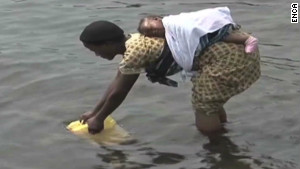 |
Life in Goma amid crisis |
At least 11 killed in suicide attacks on church at Nigerian military base
Lagos, Nigeria (CNN) -- Two bombs killed at least 11 people and wounded 30 in a church inside the military barracks in Jaji, Nigeria, on Sunday.
Armed Forces spokesman Lt. Col. Muhammad Dole said a suicide bomber drove a vehicle into the side of St. Andrew Military Protestant Church and exploded a bomb at about noon. A second vehicle exploded just outside the church several minutes later.
The wounded were taken to three hospitals. An investigation is under way, Dole said.
There was no immediate claim of responsibility, but the militant Islamist group Boko Haram has frequently carried out suicide bombings in churches in northeastern Nigeria.
Boko Haram, whose name means "Western education is forbidden," seeks to impose a strict version of Sharia law in the Muslim-dominated northern part of the country. (alessia a)
Uganda lawmakers to vote on anti-gay law
(CNN) -- Lawmakers in Uganda are preparing to vote on a new anti-homosexuality bill that proposes tough jail sentences for consensual same-sex behavior.
Homosexual acts are already illegal in the east African nation, where most gays and lesbians face physical attacks and are treated as social outcasts, but the new bill proposes harsher penalties.
Uganda's maximum penalty would be life in prison.
Amnesty International said it was "extremely concerned" about the bill and called on the Ugandan parliament not to pass it.
Rebel march continues in Eastern Congo
Sake, Democratic Republic of Congo (CNN) -- Anti-government rebels on Friday continued their march through the eastern part of the Democratic Republic of Congo, withstanding an army counterattack to maintain control of the strategically important town of Sake.
The town is on the road to Bukavu, the capital of South Kivu, and a group of fighters started to march in its direction, journalist Phil Moore told CNN.
Moore and U.N. spokesman Kieran Dwyer said the M23 fighters held Sake after two days of battling government troops in the town they first entered Wednesday.
The United Nations, which supports the Congolese army, as well as Britain have condemned the rebel campaign intended to overthrow the government.
Read more: Rebel leader in Uganda for Congo crisis talks
On Friday, the Congolese army was near the town of Minova, about 15 miles south of Sake, according to Moore.
Rebel leader in Uganda for Congo crisis talks
(CNN) -- A fight for the control of Sake, a strategically placed town in the eastern part of the Democratic Republic of Congo, raged Thursday, while regional leaders sought to end the crisis.
The political leader of M23, the rebel group that captured Goma, a key city near Sake, two days earlier, flew to Uganda Thursday for talks with that country's president.
The United Kingdom's minister for Africa, Mark Simmonds, arrived in Kigali, Rwanda, Thursday and immediately issued a statement saying "there can be no attempt to unseat the legitimate government of the Democratic Republic of Congo" while calling on the DRC government to "address the underlying causes of the conflict."
"I call on the M23 to stop its advance and to withdraw from Goma immediately," Simmonds said. "This would benefit the people of the DRC and is the will of the governments of the region and the whole international community."
Oxfam, which is monitoring humanitarian conditions in the area, warned Thursday that the fall of Goma to the rebels poses "a very real risk of complete collapse of state authority and the humanitarian crisis reaching new depths."
Rebels seize control of Goma amid clashes in Democratic Republic of Congo
(CNN) -- Congolese rebels took control of the eastern city of Goma and part of the border with Rwanda on Tuesday after days of heavy clashes, a Congolese reporter there said.
The rebels took control of the government radio station in Goma and were seen walking through town, entering government and police buildings, said the reporter, who could not be named for security reasons.
The rebels are part of the M23 rebel group, which has been engaged in heavy fighting with Congolese army forces in the region since last Thursday.
Though 1,500 United Nations peacekeeping troops are in Goma and have control of the airport there, a U.N. spokesman said the situation is at a "critical stage."
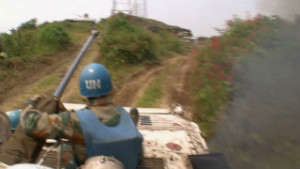 |
Rebels recruiting in the Congo |
Kenya grenade blast kills 7, hurts 24
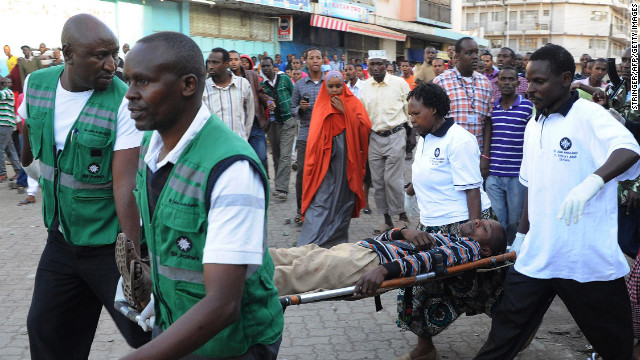
Nairobi, Kenya (CNN) -- A grenade explosion killed seven people and wounded another 24 on Sunday in a predominantly Somali neighborhood of Nairobi, a Kenya Red Cross official said.
The grenade was tossed onto a minibus, known as a matatu, full of passengers riding through the Eastleigh section, according to local media reports.
No group has claimed responsibility for this attack.
Such attacks have escalated since Kenyan forces invaded neighboring Somalia last year to battle the Islamist militant group Al-Shabaab, blaming it for kidnappings of foreigners in the nation.
A grenade thrown into a Kenyan church two weeks ago turned a prayer service into carnage, killing one worshipper and wounding 13 others.
Monday, November 19, 2012
Kenya grenade attack: Somalis attacked in Nairobi

Kenyan police have fired tear gas to end riots that broke out in the capital, Nairobi, after a grenade blast killed at least seven people.
Shops were looted in the Eastleigh neighbourhood, as angry youths blamed ethnic Somalis for Sunday's explosion, a businessman said.Somalia's al-Qaeda-linked al-Shabab group has been blamed for a spate of attacks in Kenya in recent years.
Meanwhile, two Kenyan soldiers have been shot dead near the Somali border.
The two were part of the African Union mission in Somalia but crossed back into Kenya to repair their truck in the town of Garissa when they were attacked, an army spokesman said.
Kenya sent troops across the border last year to fight al-Shabab but its forces have since been merged with the AU force in Somalia.
Nigeria's Boko Haram battle: Army rejects 'killing' video

The man pleaded for his life before apparently being shot
Nigeria's military has dismissed as fake a video said to show a soldier shooting dead a captive at close range in the northern city of Maiduguri.
A soldier who said he filmed the killing two weeks ago passed the recording to the Reuters news agency. Nigeria's security forces have repeatedly been accused of summary executions while fighting the militant Islamist group, Boko Haram.
The BBC has not been able to verify the video's authenticity.
BBC Nigeria correspondent Will Ross says the video shows a man being pushed to the ground by a soldier, kicked in the head and then shot dead.
Thursday, November 15, 2012
New Ebola outbreak erupts near Uganda capital
Officials say three new deaths confirmed and several evacuations under way in central region only 62km from Kampala. |

The virus also struck Uganda in July when it claimed 14 lives.
|
Up to three people have died in Uganda from an outbreak of the Ebola virus in its central region, near the capital Kampala, according to officials. Health Minister Christine Ondoa said on Thursday that two of the dead were from one family in Luwero district. Ondoa told reporters: "Another viral hemorrhagic fever, Ebola, has broken out in the country ... a total of three people have, since the onset of the outbreak ,died". |
Uganda to pass anti-gay law as 'Christmas gift'
Ugandan gay people often fear living openly

Uganda will pass a new law against homosexuality by the end of 2012 as a "Christmas gift" to its advocates, the speaker of parliament has said.
The AP news agency quoted Rebecca Kadaga as saying that Ugandans were "demanding" the law.Homosexual acts are already illegal in Uganda, but the bill which is before parliament proposes tougher sentences for people convicted.
Foreign donors have threatened to cut aid if gay rights are not respected.
The bill, tabled by MP David Bahati, proposes jail terms for homosexual acts, including a life sentence in certain circumstances.
Mali crisis: African Union backs plan to deploy troops
A harsh form of Islamic law has been imposed by Islamists in parts of Mali they control

The African Union (AU) has backed a plan to send troops into Mali to clear the north of Islamist extremists.
It endorsed the decision by West Africa's regional bloc Ecowas on Sunday to send 3,300 troops to help Mali's government retake the region.The plans will now go before the UN Security Council for approval before the end of the year.
Islamist groups and Tuareg rebels took control of the north after Mali's president was overthrown in March.
The UN has warned that the Islamist militias are imposing a harsh version of Islamic law on the areas they control and that forced marriage, forced prostitution, and rape are becoming widespread.
Monday, November 12, 2012
Egypt's Coptic Christians choose new pope
Bishop Tawadros (pictured) was chosen to serve as Egypt's new Coptic Christian pope from among three candidates on Sunday. Pope Shenuda III died in March amid fears of how Christians would fare under the ruling Muslim Brotherhood.
Bishop Tawadros was chosen as new Pope of Egypt's Coptic Christians Sunday when a blindfolded altar boy picked his name from a chalice in a ceremony invoking divine guidance for the beleaguered minority.
Acting head of the church Bishop Pachomius took the ballot from the boy's hand and, showing it to those crowded into St Mark's Cathedral, announced: "Bishop Tawadros."
The crowd erupted in cheers and applause as church bells tolled in celebration across the country.
The new Pope of Alexandria and Patriarch of All Africa in the Holy See of St Mark the Apostle succeeds Pope Shenuda III, who died in March leaving behind a community anxious about its future under an Islamist-led government.
Tawadros, 60, a bishop in the Nile Delta province of Beheira, was among three potential candidates -- the other two being Bishop Rafael, 54, a medical doctor and current assistant bishop for central Cairo, and Father Rafael Ava Mina, 70.
Regional envoys, Islamists to meet for Mali peace talks

Regional envoys met with Islamist group Ansar Dine on Sunday for talks on resolving Mali's political crisis in the wake of media reports saying the militants are ready to distance themselves from al Qaeda's North African branch, also known as AQIM.
Senior mediators in the Mali crisis will try to convince one of the Islamist groups controlling the country's north to cut ties with Al-Qaeda's North Africa branch, an official said Saturday, as an Algerian newspaper said the group was considering such a move.
West Africa bloc Ecowas agrees to deploy troops to Mali
 Militant Islamists in northern Mali are imposing strict Sharia law despite opposition from the local Muslim population
Militant Islamists in northern Mali are imposing strict Sharia law despite opposition from the local Muslim population
West African regional leaders have agreed to deploy 3,300 soldiers to Mali to retake the north from Islamist extremists.
The soldiers would be provided mainly by Nigeria, Niger and Burkina Faso.
Islamist groups and Tuareg rebels took control of the north after Mali's president was overthrown in March.
Ivory Coast President Alassane Outtara told reporters in the Nigerian capital, Abuja, that the soldiers could be deployed as soon as the UN approved the military plan.
Thursday, November 8, 2012
Tunisia to grant US access to Benghazi attack suspect
Tunisia to grant US access to Benghazi attack suspect

Tunisia will allow US investigators access to a suspect in the September attack on the American consulate in the Libyan city of Benghazi, US senators said Friday. Ali Ani al Harzi was arrested in Turkey in October and deported to his native Tunisia.
By News Wires (text)
The Tunisian government will allow the United States access to a suspect in the attack on the U.S. consulate in Benghazi, Libya, two senators said Friday.
Islamist Mali rebels Ansar Dine urge dialogue
Islamist Mali rebels Ansar Dine urge dialogue

Ansar Dine, an Islamist group occupying northern Mali, called for dialogue Tuesday as it faced the prospect of a violent ouster by interstate troops, dispatching envoys to Burkina Faso and Algeria in a bid to negotiate an end to the crisis.
By News Wires (text)
Ansar Dine, an Islamist group occupying northern Mali, called Tuesday for other fighters to join them in political dialogue, as military chiefs plot strategies to expel the extremists using force.
As diplomatic efforts for a military solution to the seven-month occupation of Mali's vast arid north intensify, Ansar Dine has dispatched envoys to Burkina Faso and Algeria in a bid to negotiate an end to the crisis.
As diplomatic efforts for a military solution to the seven-month occupation of Mali's vast arid north intensify, Ansar Dine has dispatched envoys to Burkina Faso and Algeria in a bid to negotiate an end to the crisis.
Mali arrests French radical Ibrahim Ouattara 'for Islamist ties'
 The al-Qaeda linked militants have introduced strict Islamic law
The al-Qaeda linked militants have introduced strict Islamic law
French radical Muslim Ibrahim Ouattara has been arrested in central Mali, defence officials have said.
Earlier this week West African army chiefs adopted a military plan to expel the al-Qaeda linked rebels.
It was reported last month that groups of foreign fighters from Algeria and Western Sahara were arriving in northern Mali to boost Islamist forces.
The details of the plan adopted by the military chiefs have not been made public - and came as one of the main Islamist groups, Ansar Dine, committed to peace talks with the new unity government in Bamako.
'Too moderate'
Sunday, November 4, 2012
Somalia to get first female foreign minister
 Abdi Farah Shirdon took office
as prime minister last month
Abdi Farah Shirdon took office
as prime minister last month
Somalia is to get its first female
foreign minister in a cabinet formed by new Prime Minister Abdi Farah
Shirdon.
Fauzia Yusuf Haji Adan is among 10 politicians joining a cabinet that has been significantly reduced in size.
She described her inclusion as "historic" for both the country and Somali women in particular.
However, correspondents say Mr Shirdon may struggle to get his choices through parliament because some clans feel they have not been properly represented.
Mr Shirdon, an ex-businessman, took office last month after his nomination - by President Hassan Sheikh Mohamud - was approved by MPs.
The election of Mr Mohamud in September was considered the first fair poll in the capital Mogadishu for 42 years.
They take on a country that has been without effective central authority for more than 20 years while clan-based warlords, Islamist militants and Somalia's neighbours all battled for control following the 1991 overthrow of President Siad Barre.
Big challenge
"After long discussions and consultations, I have named my cabinet which consists of only 10 members. Among them is a female foreign affairs minister for the first time in Somali history," the prime minister said.

Ms Adan hails from the self-declared independent state of Somaliland and lived for a long time in Britain, the AFP reports.
"My nomination as the foreign minister is historic for the Somali country and particularly for the women of Somalia, it turns a new page for the political situation of our country and will lead to success and prosperity," she said.
The biggest challenge facing Somalia's new UN-backed leaders is the al-Qaeda-aligned Islamist group, al-Shabab.
Despite losing key towns over the last few months, the militants still control large areas of rural southern and central Somalia.
Al-Shabab supporters have carried out a number of suicide attacks in the capital, Mogadishu, since the group was driven out of the city by African Union and pro-government forces last year - including several since Mr Mohamud's election.
Kenya policeman killed, 11 injured in church attack
 The injured were taken to
Garissa district hospital, with some then airlifted to the capital Nairobi for
further treatment
The injured were taken to
Garissa district hospital, with some then airlifted to the capital Nairobi for
further treatment
A grenade attack on a church in a
police compound in eastern Kenya has killed one police officer and injured at
least 11 other people, reports say.
The man who died was serving as pastor of the targeted church, in Garissa town near the border with Somalia.
Most of the wounded are also reported to be police officers; some of whom were airlifted to hospital in Nairobi.
In July, 15 people were killed in raids on churches in Garissa, and suspicion fell on the al-Shabab militant group.
Police blamed the Somalia-based group and its sympathisers for the attack, and said they were angry over Kenya's role in a UN-backed intervention force.
Kenya's capital Nairobi and the port city of Mombasa have suffered a series of grenade attacks since Kenya sent troops into Somalia last October.
'Confusion'
Witnesses were quoted as saying that the grenade in Sunday's attack was thrown from outside the compound, and landed on the iron-sheeted roof of the church while the officers and their families were inside attending a prayer session.

"It is believed to be a motor thrown or a grenade because it penetrated the roof before landing within the crowd. There is confusion," one police officer at the scene was quoted by Kenya's The Standard as saying.
Gunfire was also reportedly heard at the scene of the explosion.
Kenya's Red Cross said 11 wounded people were taken to hospital in Garissa, with three evacuated by air to Nairobi for further treatment.
Regional police chief Philip Tuimur said a major operation was under way to track down the attackers.
No group has yet claimed responsibility for the attack, but suspicion will once again fall on al-Shabab.
In September, one child was killed and three seriously injured in a grenade attack on a church in Nairobi.
A mob later rounded on Somalis living near the church, injuring 13 people with sticks and stones.
Sunday, October 21, 2012
Breast Cancer
Breast cancer is the second most common cancer among women in Sub-Saharan Africa, accounting for 16.8 percent of all female cancers. Central, West, and East Africa appear to have lower incidence rates than southern Africa, the latter estimated at 33.4 per 100,000. An estimated total of 48,600 cases occurred in Sub-Saharan Africa in 2002.
Worldwide, risk factors for female breast cancer include menstrual and reproductive factors, high body mass index (BMI), family history of breast cancer, and certain genetic mutations, including BRCA1/2. Other suggested risk factors include, to a much lesser extent, high alcohol consumption, contraceptive use, and the use of certain postmenopausal hormone replacement therapies. Reproductive and hormonal factors appear to be the most important, with risk being increased by early menarche, late menopause, late age at first birth, and low parity (Henderson, Ross, and Bernstein 1988).
Studies in Sub-Saharan Africa have also found reproductive and hormonal factors to be important, reporting increased risk with advanced age at first pregnancy and delivery, low parity, and late age at menarche (Adebamowo and Adekunle 1999; Coogan et al. 1996; Shapiro et al. 2000; Ssali, Gakwaya, and Katangole-Mbidde 1995).
In Sub-Saharan Africa, higher incidence rates and relative frequencies of breast cancer have been reported in association with urban than with rural residence (Oettlé and Higginson 1966; Schonland and Bradshaw 1968), but data are sparse. The incidence of breast cancer is much higher among white women in Africa than among black African women; for example, in Harare between 1993 and 1995, the incidence was 127.7 per 100,000 in whites and 20.4 in blacks (Chokunonga et al. 2000). These differences may be a reflection of the distribution of lifestyle factors thought to be important in the development of breast cancer, for example, low parity and high body mass.
Breast cancer risk has been associated with socioeconomic status, with women of higher social class (as measured by education, income, housing, and so forth) having a higher risk (Kogevinas et al. 1997). Once again, such differences are most likely a reflection of different prevalences of risk factors among social classes (for example, parity, age at menstruation and menopause, height, weight, alcohol consumption).
The effect of oral contraceptive hormones on the risk of breast cancer has been the subject of much research. There appears to be a small but detectable risk in women currently using oral contraceptives, but this diminishes when contraception ceases, and after 10 years, none of the excess risk remains (Reeves 1996). A case-control study in South Africa found that combined oral contraceptives may result in a small increase in risk, confined to women below the age of 25 years, but that injectable progesterone contraceptives did not increase risk (Shapiro et al. 2000).
Dietary fat appears to be correlated with the risk of breast cancer in interpopulation studies (Prentice and Sheppard 1990), but the association has been difficult to confirm in studies of individuals (Hunter et al. 1996). However, obesity in postmenopausal women has been identified as a risk factor in Europe (Bergstrom et al. 2001) as well as in Sub-Saharan Africa (Adebamowo and Adekunle 1999; Walker et al. 1989). Although traditional diets in Africa are typically low in animal products, especially fat, and high in fiber (Labadarios et al. 1996; Manning et al. 1971), this pattern is being modified by urbanization and Westernization of lifestyles, which may lead to an increase in breast cancer incidence in African populations. A case-control study in Cape Town did not find a protective effect of breastfeeding on breast cancer (Coogan et al. 1999). However, in a meta-analysis of 47 studies from 30 countries breastfeeding appears to be protective; based on a reanalysis of about 50,302 cases and 96,973 controls, two-thirds of the difference in rates between developed and developing countries were estimated to be attributed to breastfeeding (International Collaboration on HIV and Cancer 2002).
At least part of the familial risk of breast cancer is mediated through the major susceptibility genes BRCA1 and BRCA2 (about 2 percent of breast cancer cases in Europe). Very little is known of the prevalence of these mutations in African populations, although family history of breast cancer is also a risk factor in this setting (Rosenberg et al. 2002).
About 1 percent of all breast cancer cases occur in men, with the male-to-female ratio being higher in black and African populations than among white populations (Parkin et al. 2003; Sasco, Lowels, and Pasker de Jong 1993).
A review of the literature indicates a deficit of studies on breast cancer risk in Sub-Saharan Africa, and further research could be beneficial. As certain groups become more Westernized and urbanized, with associated changes in diet, later childbirth, and reduced parity and periods of breast-feeding, breast cancer incidence may increase. Public health campaigns should encourage breastfeeding unless there are good reasons not to (for example, HIV-infected mothers where milk powder and sterile water are freely available). There is no organized mammography screening program in Sub-Saharan Africa.
Worldwide, risk factors for female breast cancer include menstrual and reproductive factors, high body mass index (BMI), family history of breast cancer, and certain genetic mutations, including BRCA1/2. Other suggested risk factors include, to a much lesser extent, high alcohol consumption, contraceptive use, and the use of certain postmenopausal hormone replacement therapies. Reproductive and hormonal factors appear to be the most important, with risk being increased by early menarche, late menopause, late age at first birth, and low parity (Henderson, Ross, and Bernstein 1988).
Studies in Sub-Saharan Africa have also found reproductive and hormonal factors to be important, reporting increased risk with advanced age at first pregnancy and delivery, low parity, and late age at menarche (Adebamowo and Adekunle 1999; Coogan et al. 1996; Shapiro et al. 2000; Ssali, Gakwaya, and Katangole-Mbidde 1995).
In Sub-Saharan Africa, higher incidence rates and relative frequencies of breast cancer have been reported in association with urban than with rural residence (Oettlé and Higginson 1966; Schonland and Bradshaw 1968), but data are sparse. The incidence of breast cancer is much higher among white women in Africa than among black African women; for example, in Harare between 1993 and 1995, the incidence was 127.7 per 100,000 in whites and 20.4 in blacks (Chokunonga et al. 2000). These differences may be a reflection of the distribution of lifestyle factors thought to be important in the development of breast cancer, for example, low parity and high body mass.
Breast cancer risk has been associated with socioeconomic status, with women of higher social class (as measured by education, income, housing, and so forth) having a higher risk (Kogevinas et al. 1997). Once again, such differences are most likely a reflection of different prevalences of risk factors among social classes (for example, parity, age at menstruation and menopause, height, weight, alcohol consumption).
The effect of oral contraceptive hormones on the risk of breast cancer has been the subject of much research. There appears to be a small but detectable risk in women currently using oral contraceptives, but this diminishes when contraception ceases, and after 10 years, none of the excess risk remains (Reeves 1996). A case-control study in South Africa found that combined oral contraceptives may result in a small increase in risk, confined to women below the age of 25 years, but that injectable progesterone contraceptives did not increase risk (Shapiro et al. 2000).
Dietary fat appears to be correlated with the risk of breast cancer in interpopulation studies (Prentice and Sheppard 1990), but the association has been difficult to confirm in studies of individuals (Hunter et al. 1996). However, obesity in postmenopausal women has been identified as a risk factor in Europe (Bergstrom et al. 2001) as well as in Sub-Saharan Africa (Adebamowo and Adekunle 1999; Walker et al. 1989). Although traditional diets in Africa are typically low in animal products, especially fat, and high in fiber (Labadarios et al. 1996; Manning et al. 1971), this pattern is being modified by urbanization and Westernization of lifestyles, which may lead to an increase in breast cancer incidence in African populations. A case-control study in Cape Town did not find a protective effect of breastfeeding on breast cancer (Coogan et al. 1999). However, in a meta-analysis of 47 studies from 30 countries breastfeeding appears to be protective; based on a reanalysis of about 50,302 cases and 96,973 controls, two-thirds of the difference in rates between developed and developing countries were estimated to be attributed to breastfeeding (International Collaboration on HIV and Cancer 2002).
At least part of the familial risk of breast cancer is mediated through the major susceptibility genes BRCA1 and BRCA2 (about 2 percent of breast cancer cases in Europe). Very little is known of the prevalence of these mutations in African populations, although family history of breast cancer is also a risk factor in this setting (Rosenberg et al. 2002).
About 1 percent of all breast cancer cases occur in men, with the male-to-female ratio being higher in black and African populations than among white populations (Parkin et al. 2003; Sasco, Lowels, and Pasker de Jong 1993).
A review of the literature indicates a deficit of studies on breast cancer risk in Sub-Saharan Africa, and further research could be beneficial. As certain groups become more Westernized and urbanized, with associated changes in diet, later childbirth, and reduced parity and periods of breast-feeding, breast cancer incidence may increase. Public health campaigns should encourage breastfeeding unless there are good reasons not to (for example, HIV-infected mothers where milk powder and sterile water are freely available). There is no organized mammography screening program in Sub-Saharan Africa.
Subscribe to:
Comments (Atom)



